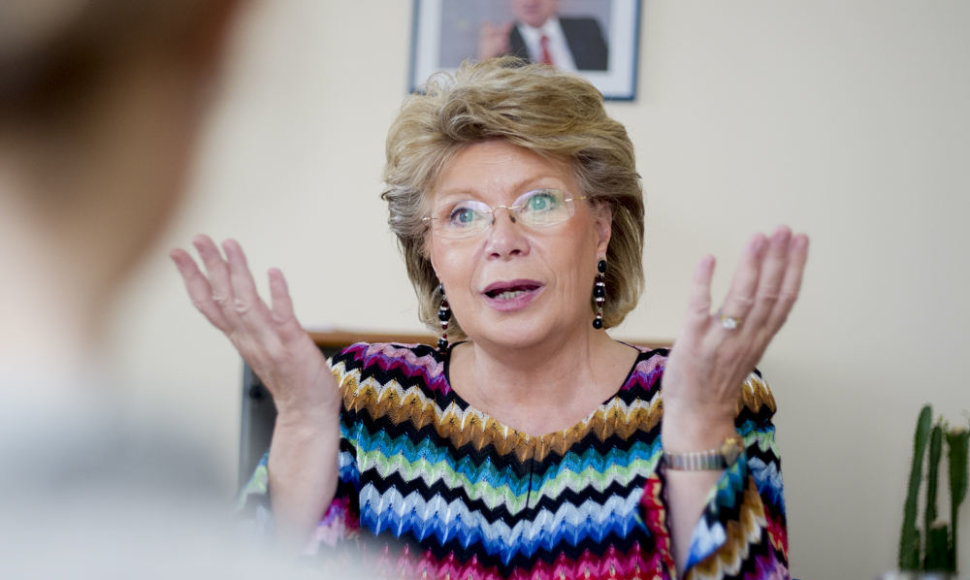In an interview to 15min, Reding speaks about complaints voiced by Lithuania's LGBT community as well as its Polish-speaking minority, about the euro crisis, and Lithuanian President Dalia Grybauskaitė's chances of landing one of the top posts in the European Union.
– You are the first EU Commissioner for Justice, Fundamental Rights and Citizenship. In your website, you promise to make sure that Member States respect the Charter of Fundamental Rights and apply a “zero tolerance policy” when it comes to violations of the EU Charter. In Lithuania, certain human rights are at risk, for instance, those of sexual minorities. They don't get permission to organize traditional Baltic Pride march in the center of Vilnius and, furthermore, they complain about constant discrimination and harassment. How do you see the situation in Lithuania?
– I have seen that 500 years ago, in 1529, Lithuania had this statute against discrimination of women. So you have done things here hundreds of years before others noticed that there was a problem. I hope, therefore, that by evolving in your society, you will not create new problems.
Citizens are equal, whatever their status, whatever their sexual behaviour. If they behave according to the law, there shouldn't be any discrimination. Non-discrimination is inscribed in our treaty. It is one of the principles on which Europe is based and I trust that there will be a positive evolution in this country.
– Do you receive many complaints from Lithuanian politicians, human rights activists, and NGOs regarding this issue?
– The Agency for Fundamental Rights in Vienna conducted a study on the discrimination against LGBT people throughout Europe. and the results of that study were awful. There is very strong discrimination going on in all levels of society: in the street, at school, at workplace. And it goes all the way to violent attacks, so that those people are afraid to go out, to behave normally. I am not speaking now about holding a gay pride even, I speak about everyday life. And we have seen that there is a real problem – and violence against any group of people is unacceptable and it goes against the law.
So recall the year 1529 when you say that violence against women is unlawful. Now we are in the 21st century and I believe that a little more acceptance of difference in human beings should be installed.
– Another issue of some concern is Lithuanian is the Polish minority's demand to use the original spelling of their names in official documents. It is a big obstacle in bilateral relations with Warsaw. Although such questions are left to the Member States, how would you comment on the issue in the context of human rights?
- You have heard me saying very clearly that open discrimination against and pushing out groups of people, violence against them is really unacceptable. The question of how you write things in official documents – that is linked to the national prerogatives.
We're speaking here about subsidiarity, about the way you're doing things in a given society, and let it be so. I do not believe that this is a question that the EU can take hand in. The rules governing the name of all persons fall within the competence of the member states.
But again, you cannot discriminate on the basis of nationality. So this equilibrium needs to be reached so that people of all kinds can live freely in any society. That means respect for one another from the society and from the individual. If you ask that I show respect for your specificity, you also have to respect mine. And that is how a society and also Europe function. Europe is culturally diverse, but cultural diversity means not that you put your differences on top of everything, but that different people can work, can live together, can be citizens together without pushing it.
- Heated debate on the future of the euro zone and the EU as such is going on. The UK is considering to leave the EU while others suggest to move towards deeper integration or even creation of the United States of Europe. What do you, being born in Luxembourg, one of the EU's founding countries, and working in one of the most important EU institutions, think about that?
– I think it (breaking up of the EU) is simply out of the question. When you join this family, nobody forces you to do it. It is not like you are born in a family and have to live in it because that's life. No, here you are free to decide in a sovereign way if you want to join the family.
Once you have, you behave according to the rules which you have agreed to. And no family can live with different rules for every family member. Nor can you live continuously with family members who are doing cherry-picking, the others would say: are we stupid or what?
Now, coming to the euro, a lot of doomsday sayers were saying: the euro is going to collapse. No, the euro is one of the strongest currencies in the world. It is the second exchange currency worldwide. Many complain that the euro is too strong as compared to the dollar.
So stop saying the euro is a problem. No, the euro is the solution. If we didn't have the euro in this crisis, there would have been a lot of devaluations, a huge inflation, so the euro is the best barrier against inflation which exists in the world. Look at those who are not in the euro – just the example of Great Britain and the United States. Their inflation is much higher than the inflation of even the crisis-stricken euro countries.
And we decided to keep the euro members in the euro zone. Doomsayers say that the euro area is going to fall in pieces, countries are going to move out of it, but the opposite has happened. If one is in trouble in a family, what does the family do? And if there is a child who is ill, all the family members come in order to help. So that is exactly what has happened in the EU.
And I am very confident that very soon your county is going to join the euro. You had a crisis in this country, a strong and serious one. And you have decided you're going to get out of it, you have not been around asking for help, you have done it by yourselves. It is not an easy thing, everybody has to take on suffering. But now you have managed to come out of the crisis being one of the best performers in terms of growth. 3 percent and more, which is a very high growth rate in Europe. So that shows that if u have the will to get out of trouble, you get out of trouble and you come out stronger.
– Only a month is left until Lithuania takes over the EU Council Presidency for the first time in history. What will be our main tasks and how not to fail?
– You are a new member of the EU, a small country, and there you come and have to take over this enormous responsibility. And that you have your question marks is absolutely normal. I can only tell you about the experience of a really small country, because you're a big country if you compare yourself to Luxembourg. We have done this since the creation of the EU and we have learned that presidency means serving.
It is not a power game, you are serving the community. Taking over for all the others and trying to continue what those before have done and leave unfinished business to those who come after. But during these six months, bring the whole community of 28 member states – that's how many there will be when you start – to solve problems, to find solutions, to find agreement. That is what you are doing, like a father or a mother in a family who has a lot of children and tries to bring them around a table so that they have a nice meal together and don't fight.
I believe it will be a very important experience for your country. I can tell you that if you look in the history of the EU, it were normally the small countries who have done the best presidencies, for the simple reason that they think about how they can bring this family to progress, whereas some big countries think more about power and themselves. And so I don't doubt at all, knowing also very well Dalia Grybauskaitė, your wonderful president, that this is going to be a success story.
– Appointed as the first Lithuanian EU Commissioner, Grybauskaitė was serving with you. Now she is mentioned in the media as a possible candidate to replace EU President Herman van Rompuy. Being her teacher, how do you assess her chances to take this post?
– For the moment, everything is speculation, because nobody is resigning and nobody is a candidate now, we're all working in our posts. But I think Lithuanians should regard the fact that this speculation is going on as a big compliment. That is a compliment not only for Dalia, who would be very capable for any of the responsible top-level jobs in Europe, but it is also a compliment for the Lithuanians. You are part of the family since very recently and there already goes speculation about having one of your own with a top level post. Bravo Lithuania.













